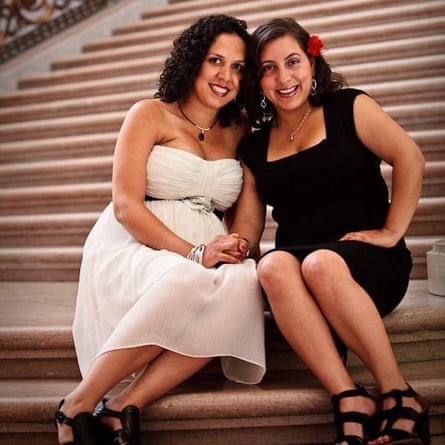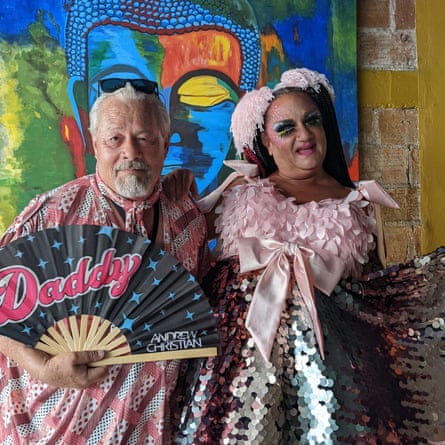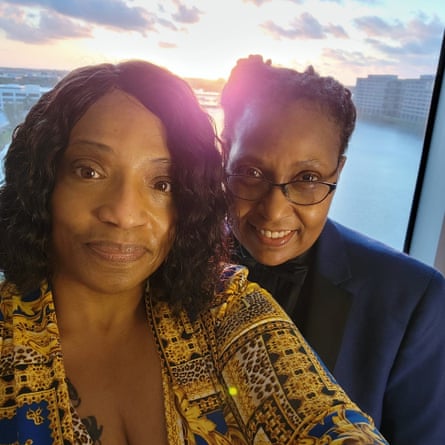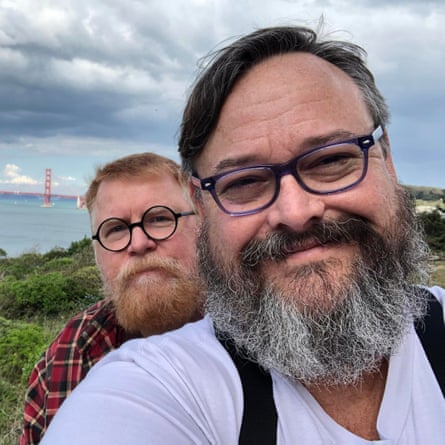“Euphoria.” That’s how Jim Obergefell describes his reaction on 26 June 2015, when, “after a lifetime of feeling less than, of feeling outside of society”, the supreme court affirmed the right to same-sex marriage in Obergefell v Hodges.
The landmark civil rights case for which Obergefell served as lead plaintiff capped a string of court victories for LGBTQ+ people in the US, including a ban on criminalizing gay sex and the repeal of Don’t Ask, Don’t Tell. It appeared to signal a new era of tolerance and civil rights in the US.
But just seven years later, Obergefell’s mood has darkened.
“People are terrified,” he says. “They’re rightly afraid of losing the right to marry the person they love. How long before this court decides that the 2003 decision, Lawrence v Texas, isn’t part of our national tradition and same-sex intimacy becomes illegal again?”
The most frightening thing about Roe’s undoing is that the supreme court was so zealous in undoing decades of precedent, says Alex Lemberg, a San Francisco attorney who identifies as queer.
Precedent is “one of the most important things in the American legal system,” they said. “Previous judicial decisions are binding on all other courts, and this decision tampers with that.”
In other words, a court empowered to ignore its own tradition is more likely to do it again.
Roe v Wade hinged on a right to privacy, a concept whose constitutional fuzziness Justice Alito attacked full-on, while Obergefell, Lemberg says, is different because it’s “explicitly linked to the equal clause of 14th amendment”.
“It’s not an automatic path to overturning [same-sex marriage] from overturning Roe,” they said, “although certainly, I don’t put it past these Trump-appointed judges to be logically inconsistent.”
In a concurring opinion Friday, Justice Clarence Thomas wrote that the court should use the same rationale it followed to overturn Roe to “reconsider” Lawrence, Obergefell and Griswold – the cases that established the rights to same-sex relationships, same-sex marriage and contraception. If that were to happen, the lives of these longterm couples would be upended. Here’s what they are thinking:
‘I want to counter this with organizing’
“Marriage was a way to offer protections,” says Bobbi Lopez, who identifies as cis queer and serves on the executive board of the California Democratic party. “The biggest concern I had was making sure I could make medical decisions for my son, who has epilepsy – and prior to that, I couldn’t – and for my wife.

Originally from Mexico, she says growing up in the American south led her to seek legally codified protection in Oakland, where she lives now. State recognition has come in steps, including a civil partnership. And any threat to LGBTQ+ rights must be met with one response: out-hustling the right.
“I think it’s a direct response to what we’re seeing as coordinated domestic terrorist attacks against LGBTQ+ people,” Lopez says. “I don’t want to live my life afraid, want to counter this with organizing. We need to ensure that we don’t let this sort of fear-mongering terrorize us.”
‘It’s a reverse of so much progress’
William Baker and Danyol Leon are Americans living in Puerto Vallarta as temporary residents. They met in California in 1995, registered as domestic partners two years later, then had a “very traditional” though not technically legal ceremony in 2002.

Six years later, they were among the 18,000 California couples who got married during the brief window between the state supreme court’s recognition of marriage equality and Proposition 8 in November 2008, which reversed the right to same-sex marriage in the nation’s largest state.
“We never lost our marriage status,” Leon says. “We were part of this historic group of people that were legally married – but it wasn’t legal.”
They’re not legally wed in Mexico either, where they’ve lived since 2019. But Baker isn’t worried about his marriage as much as a growing climate of homophobia in California, where newly empowered far-right protesters menace gay bars in West Hollywood and protested outside a lesbian-owned pizza shop in the gay-friendly resort town of Guerneville.
“We are here [in Mexico] forever. We feel at home here,” says Leon, who also performs drag under the name Tamale Ringwald. “I feel safer here than I do in San Francisco sometimes. Being a queer man, that’s a huge statement.”
“It’s just a reverse of so much progress that’s been made in recent years,” says Baker. “We know that these things trigger certain kinds of behavior in people. One of the reasons that we started thinking about coming to Mexico in the first place was the administration we had in the US and the direction that seemed to be taking everything.”
‘I am not going back in the closet’
Rochelle Johnson first met her wife, Delena Williams, in high school but reconnected romantically later in life. They pursued a civil union before eventually filing for marriage in Pennsylvania.

“I still have faith that we’re going to get through this, but what are the alternatives to protect ourselves?” asks Johnson, a social worker and drag king, who connects the backlash against LGBTQ+ Americans as much to reproductive rights as to laws intended to suppress Black voters. “I pray that we do not go back. I was just telling someone the other day that I am not going back in the closet!”
Williams sees hope in organizations that had worked with LGBTQ+ communities of color pre-Obergefell springing back to life in response to renewed assaults on queer visibility. “I’m raising an adopted granddaughter and what does this mean for her? If this moves forward and our marriage is not legal anymore, what is the protection if something happens to one of us?” she says. “I’m very afraid right now.”
‘They’ve learned a lot from attacking us for years’
Suzanne Ford, a trans woman and the executive director of San Francisco Pride, began her transition after her marriage to her wife, Beverly.
“We are still married,” Ford says, “although obviously with my designation as female, we shouldn’t take anything for granted”.
“I’ve been yelling this for the last five years,” Ford says. “We’re the most easily visible thing that the right can point to that’s ‘wrong.’ It’s red meat for them. They’ve learned a lot from attacking us for years. It gave them some momentum.”
‘We’re both fighters’
“Our friends call us a ‘legacy couple,’” says Greg Humphrey, who has been with his husband, John Ashfield, since 1999. They registered as domestic partners in San Francisco in 2005, and married in 2014 – in Canada.

Both are US citizens and neither thinks any domestic policy shift would ever compel them to leave the country. But they say the worst-case scenario of same-sex couples fleeing to Canada for refuge evokes an image out of The Handmaid’s Tale, in which the protagonist and her husband nearly reach the border before they are intercepted and their marriage is nullified.
Humphrey and Ashfield take some comfort in living in a blue state. “California is not going to change,” Humphrey says. “There’s no going back in the closet. What happens is fight or flight, and we’re both fighters.”
